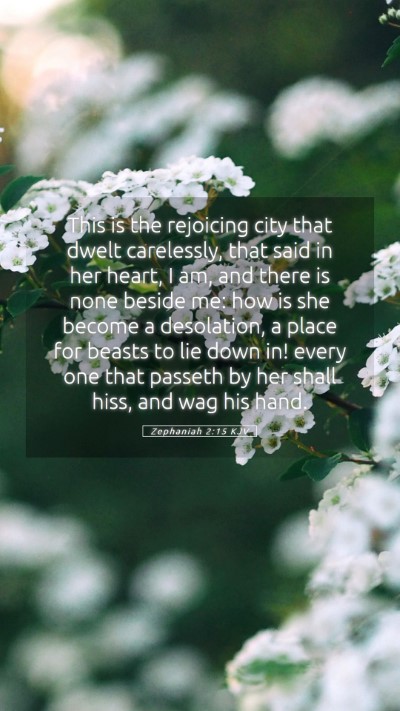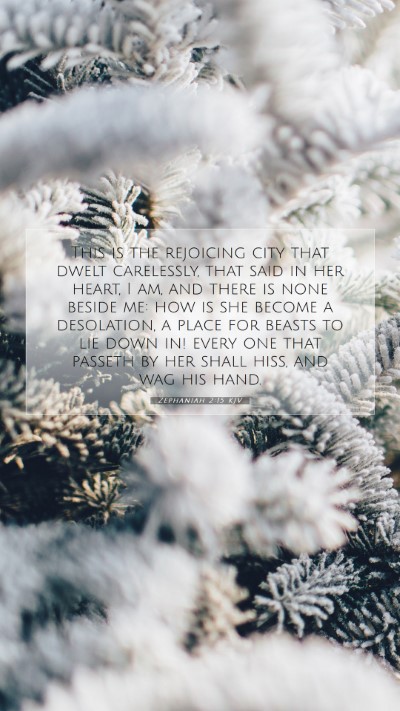Old Testament
Genesis Exodus Leviticus Numbers Deuteronomy Joshua Judges Ruth 1 Samuel 2 Samuel 1 Kings 2 Kings 1 Chronicles 2 Chronicles Ezra Nehemiah Esther Job Psalms Proverbs Ecclesiastes Song of Solomon Isaiah Jeremiah Lamentations Ezekiel Daniel Hosea Joel Amos Obadiah Jonah Micah Nahum Habakkuk Zephaniah Haggai Zechariah MalachiZephaniah 2:15 Meaning
What is the meaning of Zephaniah 2:15?
This is the rejoicing city that dwelt carelessly, that said in her heart, I am, and there is none beside me: how is she become a desolation, a place for beasts to lie down in! every one that passeth by her shall hiss, and wag his hand.
Zephaniah 2:15 Bible Verse Meaning
Understanding Zephaniah 2:15: A Comprehensive Bible Verse Explanation
Zephaniah 2:15 reads: "This is the rejoicing city that dwelt carelessly, that said in her heart, I am, and there is none beside me: how is she become a desolation, a place for beasts to lie down in! Everyone that passeth by her shall hiss, and wag his hand."
Bible Verse Meaning and Interpretation
This verse serves as a poignant reflection on the downfall of Nineveh, the capital of Assyria, which was renowned for its pride and arrogance. The commentary of various biblical scholars sheds light on different facets of its meaning:
-
Matthew Henry:
Henry emphasizes that this verse depicts the arrogance of Nineveh, a city that felt invincible due to its wealth and power. The phrase "I am, and there is none beside me" illustrates its self-sufficiency and disregard for God's sovereignty. His commentary warns that such pride leads to desolation.
-
Albert Barnes:
Barnes expands on the idea that the city’s desolation serves as a stark warning to those who place confidence in their own strength. He points out that her decay is due to her careless attitude, making it a lesson for future generations about the consequences of hubris.
-
Adam Clarke:
Clarke interprets the verse as a condemnation of complacency. The “rejoicing city” symbolizes a place that once thrived but became a wasteland, showcasing the transition from prosperity to ruin as a divine judgment.
Significance of Zephaniah 2:15
This passage not only reflects on the historical fall of Nineveh but serves as a timeless reminder of the dangers of pride and self-reliance. It compels the reader to consider the fragility of human achievements when disconnected from divine guidance.
Key Insights:
- The verse encapsulates the theme of divine justice against prideful nations.
- It emphasizes the fleeting nature of human glory and the certainty of divine judgment.
- The imagery of beasts lying down in a desolate place highlights complete abandonment and ruin.
Bible Study Insights
For those engaging in Bible study groups or online Bible study, this verse can prompt discussions around themes of humility, repentance, and the nature of God’s justice. It is an excellent example for Bible study lessons focused on the Old Testament prophets and their messages about pride and downfall.
Discussion Topics:
- What does this verse teach us about the consequences of pride?
- How can we apply the lessons from Nineveh's downfall to our lives today?
- What role does national pride play in our spiritual lives?
Cross References
This verse connects to several notable biblical passages that echo its themes:
- Isaiah 14:12-15: The fall of the prideful king.
- Jeremiah 50:29: Prophecy of Babylon's downfall.
- Obadiah 1:3-4: The pride of Edom and its consequences.
Conclusion: Applying Scripture Analysis
Understanding Scripture involves not just reading but reflecting upon the implications of verses like Zephaniah 2:15. Through biblical exegesis and critical study, believers can uncover deeper meanings and applications relevant to their lives.
By embracing lessons from such verses, individuals can cultivate humility, seek divine guidance, and recognize that true strength lies in reliance on God rather than oneself.


